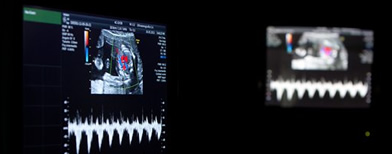A test designed to spot chromosome abnormalities in eggs could be a "revolution" in fertility, helping older women determine their chances of having an IVF baby, doctors said on Monday.

But in developing the test, they added, worrying evidence emerged that in-vitro fertilisation (IVF) may boost the risk of a baby with Down's syndrome.
"It is a fair question to ask," said Alan Handyside, director of The London Bridge Fertility, Gynaecology and Genetics Centre, who led a team of doctors from eight countries. "But we have no direct evidence yet, and I don't want to worry women."
The test was presented Monday at the annual conference of the European Society of Human Reproduction and Embryology (ESHRE) in Stockholm.
The method entails counting the sets of chromosomes in oocytes, as human eggs are called, at stages in a maturation process known as meiosis.
The idea was to vet imbalances in chromosome numbers that cause embryo abnormalities and thus miscarriage -- or, in the case of an additional chromosome 21, the mental handicap known as Down's syndrome.
The technique looks at something called a polar body, a tiny by-product cell jettisoned by the egg during the meiosis phases.
The investigators scrutinised eggs provided by 34 women, average age 40, who were undergoing IVF. It compared polar bodies left from two meiosis stages with the egg after it was fertilised by her partner's sperm.
The new test helps pinpoint healthy eggs and damaged eggs, enabling doctors to advise a woman whether it is worth the emotional and financial investment to try for a pregnancy, said Handyside.
At present, IVF clinics tend to go for a wholesale approach.
Read More....

But in developing the test, they added, worrying evidence emerged that in-vitro fertilisation (IVF) may boost the risk of a baby with Down's syndrome.
"It is a fair question to ask," said Alan Handyside, director of The London Bridge Fertility, Gynaecology and Genetics Centre, who led a team of doctors from eight countries. "But we have no direct evidence yet, and I don't want to worry women."
The test was presented Monday at the annual conference of the European Society of Human Reproduction and Embryology (ESHRE) in Stockholm.
The method entails counting the sets of chromosomes in oocytes, as human eggs are called, at stages in a maturation process known as meiosis.
The idea was to vet imbalances in chromosome numbers that cause embryo abnormalities and thus miscarriage -- or, in the case of an additional chromosome 21, the mental handicap known as Down's syndrome.
The technique looks at something called a polar body, a tiny by-product cell jettisoned by the egg during the meiosis phases.
The investigators scrutinised eggs provided by 34 women, average age 40, who were undergoing IVF. It compared polar bodies left from two meiosis stages with the egg after it was fertilised by her partner's sperm.
The new test helps pinpoint healthy eggs and damaged eggs, enabling doctors to advise a woman whether it is worth the emotional and financial investment to try for a pregnancy, said Handyside.
At present, IVF clinics tend to go for a wholesale approach.
Read More....